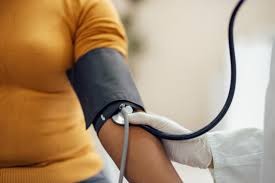Beyond salt, hidden sources affect your blood pressure — Cardiologist
… Says one high reading does confirm hypertension
With millions of Nigerians declared hypertensive, a Consultant Physician Nephrologist at the Federal Medical Centre, Ebute Metta, Lagos, Dr Danladi Nmadu has said that reducing salt intake that has been proven to cut the risk of high blood pressure by half cannot be effective without appropriate reduction of seasonings in foods.
The Cardiologists noted that although hypertension has been over-flogged, 26 per cent of Nigerians which is close to 30 percent globally still succumb to the silent killer disease.

In a chat with Good Health Weekly, Nmadu insisted that reducing the amount of salt in foods is not just table salt but also seasonings which contain a lot of salt.
He expressed worry that a lot of patients they see daily who have elevated blood pressure do not know their blood pressure is elevated.
Nmadu said salt remains a big factor in controlling hypertension. “There are a few others but restricting your salt goes along with it. There is also the need for exercise, there is also taking vegetables and a few other things that can also help. But I think the take-home is to restrict salt in your diet.
How to identify a hypertensive patient
He explained that someone has hypertension when the blood pressure is elevated above 140 (systolic) and 90 (diastolic), adding that, when someone’s blood pressure is elevated, it tends to increase the risk of cardiovascular events that cause damage to the heart, brain, sometimes damage to the kidneys.
He argued that although hypertension is overflogged, most admissions in the hospitals today are still from hypertension, lamenting that most people don’t even know what their blood pressure is.
He said genetics was the reason why some people are hypertensive. “It has been established that in blacks, hypertension is thought to be more prevalent”.
He identified kidney disease as a common cause of hypertension. notably in younger people, or individuals with thyroid disease.
“Issues with some organs can cause hypertension but most of the time there is just no cause. It’s a genetic predisposition to hypertension.”
Blood pressure measuring
To accurately measure the blood pressure, he regretted that over the years, people don’t check their blood pressure properly.
“People check their blood pressure at the wrong time. To check your blood pressure correctly, you should be sitting down with your back touching the backrest of the chair.
Your foot should be at 90 degrees. And you don’t run around come and sit down and check your blood pressure. You sit down for about five minutes and relax. You are not smoking or doing anything that may aggravate it.
“You shouldn’t be talking when your blood pressure is being checked. And then you should also not be pressed. If you want to go to the restroom, please use the restroom. Download your urine and check your blood pressure.”
He warned that one blood pressure reading does not make an individual hypertensive. “If you check your blood pressure now and it’s elevated, it doesn’t say you are hypertensive. You need to check more than once.”
Mmadu said usually doctors give patients two clinic visits to monitor their blood pressure and “if after the two visits, it showed it’s elevated, we won’t tell you hypertensive. You have to come back again at your next clinic visit and we check until we can see the elevation in your blood pressure is sustained. So, it’s not one elevation but it’s sustained elevation that puts you at risk of all these issues. You have to have sustained elevated blood pressure.”
Medication use
Mmadu who stated that medication was also necessary to control blood pressure as the drugs have been tested for 15 to 20 years, warned that most herbal medications have not passed through scientific research to be proven to work in any research.
He said there was a need for hypertensives to get health insurance for them to be able to have consistent access to drugs. He said the silent nature of hypertension has continued to deceive patients and they end up presenting very late at the hospitals when their kidneys are failing or their hearts are failing or they have a stroke.
“Usually we advise that you screen so even if you don’t feel anything just know your numbers especially when you are getting to older ages like 40. (Vanguard)


